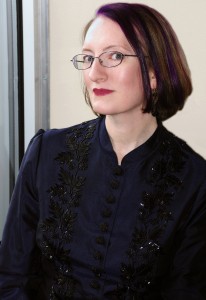actress • author interview • books • character development • character questions • Characters on the Couch • ghosts • historical fiction • history of psychology • musicians • mystery • novel • psychics • psychology • published character interview • supernatural • suspense • theatre • Thriller • Victorian psychology • writing process
Character on the Couch: Sybil Ingram
February 8, 2017
Today I’m thrilled to have Amanda Dewees and her heroine Sybil Ingram visiting my couch. It’s rare that when I read the first book in a series, I go straight to the second one, but I had to in this case. Sybil’s first book, Nocturne for a Widow, had the best combination of mystery and the supernatural plus a sexy brooding hero. I should note he’s not annoyingly broody, but definitely gothic. Once I finished it, I immediately bought and downloaded The Last Serenade. It worked out since that was the night before Thanksgiving, and so Sybil, Roderick, and co. kept me company while Hubby was finishing the Thanksgiving Half Marathon (I’d run the 5K, so I had time).
By the way, I don’t usually ponder how my characters would interact with other worlds, but I’d love to get Sybil and Marie (from the Aether Psychics series) in the same room. Or even better, on the same stage. It happened that we were writing our books with these heroines at around the same time, so we traded resources. We did not, however, reveal to each other that our respective heroes are violinists – great minds and all. That would be an interesting conversation, too.

When Sybil takes the stage again, murder plays the leading role.
In September 1873, medium and former actress Sybil Ingram is looking forward to her new life as the wife of dashing violinist Roderick Brooke. But their plans for marriage are interrupted by a cry for help from Julia de Lioncourt, Roderick’s former lover. Julia’s letter implores him to come to Paris to rescue her from a blackmailer, Danton Fournier, who holds letters that can cause her ruin.
When they arrive in Paris, the bewitching beauty proposes a daring plan: Sybil will masquerade as Julia onstage in a new melodrama while Julia, her alibi thus secured, recovers the letters from Fournier’s home. Knowing that Roderick still harbors guilt over killing Julia’s husband in a duel, Sybil agrees to the plan for his sake—even though it’s all too clear that the scheming Julia wants Roderick back in her bed. Moreover, the theater seems to harbor a ghostly presence that may foretell disaster for the masquerade.
Catastrophe strikes on the night of Sybil’s performance when Fournier’s body is discovered stabbed through the heart. Suddenly Sybil needs an alibi. But even if she is cleared of the murder, she must find a way to prevent suspicion from falling on Roderick as well—and determine whether Julia knows more about Fournier’s death than she is admitting. Can Sybil’s abilities as a spirit medium help her discover the truth before the real killer stops her?
If your character were to go to a psychologist – willingly or unwillingly – what would bring them in? Yes, a court order is a valid answer.
Concern over the issues bedeviling her fiancé, the formerly brooding Roderick Brooke, might lead her to consult an alienist, as they would be termed in 1873. Sybil considers herself an open book and thus might not see the point in consulting one on her own behalf, but she recognizes that Roderick’s past still exerts a troubling influence over him, and she wants to help him heal.
Is the presenting problem one of the main internal or external conflicts in your book? If so, how does it present itself?
One of the prime motivations in The Last Serenade is Sybil’s worry about Roderick’s inability to shake off his past emotionally. Her desire to help him find closure—even though neither has that word in their vocabulary—leads her to urge him to go to Paris to help his former lover, Julia. The conflict arises both because Roderick wants to bury his past rather than facing it, and because Sybil is afraid of what may happen to Roderick when he is once again in Julia’s presence. His love for Julia and his sense of betrayal when she ended their liaison (in the most horrible way possible—by tricking him into dueling her husband and then refusing to marry Roderick when he killed him) warped his view of women and the world in general, and Sybil fears that although he has come a long way since then he may backslide… perhaps even as far as Julia’s bed.
It’s always interesting to see how people act when they first enter my office. Do they immediately go for my chair, hesitate before sitting anywhere, flop on the couch, etc.? What would your character do?
As an actress, Sybil definitely orchestrates her entrances for maximum impact! She will sweep in—no slow walker she—with her taffeta train swishing along the floor and will instantly assess the room’s dramatic potential. If there is a couch, she can display herself and her dress to far better advantage than in a mere chair.
CD Note: There is definitely a couch in my office, and it has seen a disappointing lack of taffeta.
Does your character talk to the therapist? How open/revealing will your character be? What will he or she say first?
Sybil is a friendly and talkative soul. Once she learns that she can trust the alienist, she will be frank—at least, about her concerns for Roderick. About her own fears she may be less forthcoming. If there had been women alienists in 1873, she might find it easier to confide her own feelings. Even though she has been an actress since she was a teenager, Sybil’s early background was (lower) middle class, and that planted some inhibitions in her.
Your character walks into the bar down the street after his/her first therapy session. What does he/she order? What happens next?
Rather than ordering spirits, Sybil might charm the bartender into brewing her a pot of tea. She will then firmly but pleasantly turn down the men who are inevitably drawn to hit on her. Both because of her beauty and because actresses of her day were reputed to be loose women, she is accustomed to having to fend men off. If Roderick joins her in the bar, she won’t have that difficulty, because he can look quite fierce, especially if he thinks someone is being too forward with her.
When yo u’re building characters, do you have any tricks you use to really get into their psyches, like a character interview or personality system (e.g., Myers-Briggs types)?
u’re building characters, do you have any tricks you use to really get into their psyches, like a character interview or personality system (e.g., Myers-Briggs types)?
An author friend introduced me to the idea of using the Chinese zodiac to build characters, so I tried that approach with the first Sybil and Roderick novel, but I abandoned it pretty quickly. I have more success when I build my characters more organically. About the only trick or shortcut I use is to decide how a character dresses and why. I studied theatrical costume design and have dressed a few plays, so I always devote a lot of thought to what my characters’ clothes say about their inner lives. Sybil herself, because of her years appearing in costume, has come to view clothes as indicators of character. When she makes deductions about those around her based on their wardrobe, she is essentially (although she doesn’t know it) practicing psychology herself!
Thank you so much, Amanda! Seriously, we need to get Sybil and Marie together. They could compare fashion and the trials and tribulations of being married to violinists.
Amanda DeWees received her PhD in English literature from the University of Georgia and likes to startle people by announcing that her dissertation topic was vampire literature. Her books include the widely praised historical gothic romances With This Curse and Sea of Secrets, winner of the 2012 RONE award in mystery, and the Ash Grove Chronicles, a captivating young adult “paranormal lite” romance series set in modern-day North Carolina. Besides writing, Amanda’s passions include theater, classic film, Ioan Gruffudd, costume design, and the preservation of apostrophes in their natural habitat.
You can find out more about Amanda at her website.
The Last Serenade is available at Amazon, iBooks, Barnes & Noble, and Kobo.

